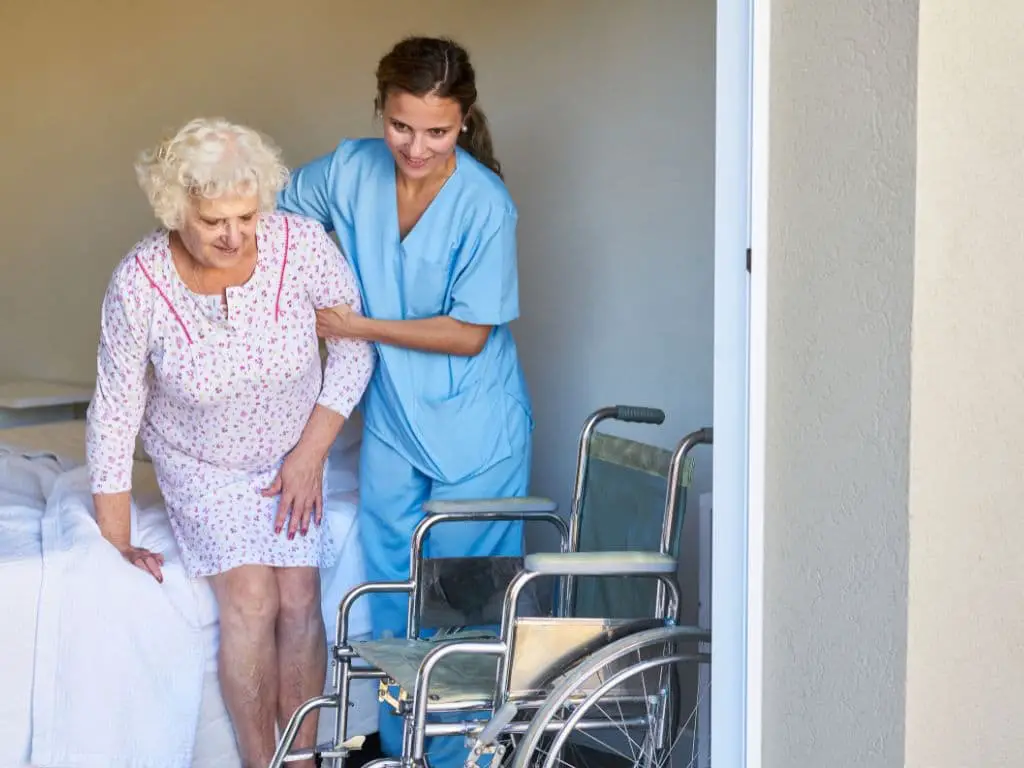Does Medicare Pay for a Home Assistant?
Yes, Medicare does pay for home assistant services under certain conditions. Home assistant services, also known as home health aide services, are fully covered by Medicare if the beneficiary requires skilled care, which includes skilled nursing or therapy services.
A home health aide provides personal care services, such as bathing, toileting, and dressing. However, it’s important to note that Medicare will not cover these services if the beneficiary only requires personal care and does not need skilled care.
In addition to home health aide services, the home health benefit also covers skilled nursing services, skilled therapy services, medical social services, certain medical supplies, and a portion of the cost for durable medical equipment. These services are provided by or under the supervision of licensed professionals and can include a range of treatments and therapies, from injections and wound care to physical, speech, and occupational therapy.
The frequency and duration of services covered by Medicare are subject to certain limits, though exceptions can be made in some circumstances. It’s important to note that Medicare should cover these services regardless of whether the beneficiary’s condition is temporary or chronic.

Does Medicare Cover Home Assistants?
Medicare Part A (Hospital Insurance) and/or Medicare Part B (Medical Insurance) provide coverage for eligible home health services, which can include assistance from home health aides under certain conditions. However, it’s important to note that the coverage is only applicable if the beneficiary is receiving concurrent skilled nursing care, and is not for personal care services alone.
Home health aides provide part-time or intermittent personal care such as help with bathing, dressing, and using the bathroom. Medicare does not cover these services if this is the only care needed by the beneficiary. Therefore, if a person requires a home assistant solely for personal care or homemaking services (like shopping and cleaning), these services are not covered by Medicare.
The beneficiary also needs to meet certain conditions to be eligible for home health services coverage. They must be under the care of a doctor or allowed practitioner, have a care plan created and reviewed regularly by a doctor or allowed practitioner, and need one or more of the services such as intermittent skilled nursing care, physical therapy, speech-language pathology, or continued occupational therapy services. The beneficiary must also be certified as homebound by a doctor or allowed practitioner.
In terms of costs, Medicare covers home health care services at no cost to the beneficiary. However, after the Part B deductible is met, they might be responsible for 20% of the Medicare-Approved Amount for covered medical equipment. Beneficiaries should be informed about the costs of any services or items not covered by Medicare by the home health agency.
What Services Does a Home Assistant Provide?
A home assistant, also known as a home health aide, provides a range of services for seniors, particularly those who have trouble leaving their home without help due to an illness or injury. The services are covered under Medicare Part A (Hospital Insurance) and/or Medicare Part B (Medical Insurance) for eligible individuals.
The services provided by a home assistant are primarily medical and therapeutic in nature. They include part-time or intermittent skilled nursing care, which is medically necessary. This might involve wound care, injections, monitoring vital signs, and other forms of health support.
Physical therapy is also provided by home assistants. This could involve exercises to improve strength and mobility, pain management, and other forms of rehabilitation. Occupational therapy is another service offered, which helps seniors to regain or maintain the ability to perform daily activities, such as eating, dressing, and bathing.
Speech-language pathology services are also provided for those who have difficulties with speech, swallowing, or cognitive impairment. Social services are offered to provide counseling and help seniors access community resources.
Home health aides also provide part-time or intermittent home health aide care, but only if the senior is also getting skilled nursing care at the same time. This could involve assistance with bathing, dressing, and other personal care tasks.
In some cases, injectable osteoporosis drugs for women and durable medical equipment are also covered. The home assistant can also provide medical supplies for use at home.
However, there are limits to the services a home assistant can provide under Medicare. For example, they cannot provide 24-hour-a-day care at home, meals delivered to home, or homemaker services such as shopping and cleaning that aren’t related to the care plan. They also cannot provide custodial or personal care when this is the only care needed.
All these services are usually coordinated by a home health care agency, which should be Medicare-certified. The agency works with the senior’s doctor or allowed practitioner to create and review a care plan regularly.
How Much Does a Home Assistant Cost?
The cost of a home assistant, also known as a home care aide, can vary greatly depending on a number of factors including the type of care needed, the number of hours required, and the geographic location.
There are several types of home care, each with its own cost range. For instance, companion care services, which mainly provide social interaction and non-medical assistance such as help with transportation and medication reminders, typically cost less than personal care assistance or home health care. Personal care assistance involves help with activities of daily living, such as bathing, toileting, grocery shopping, and mobility assistance, and therefore can cost more due to the increased level of care required. Home health care, which involves medical assistance such as injections, infusions, wound care, and therapy services, typically costs the most due to the specialized training and certification required by home health care aides.
In general, the cost of home care ranges from $20 to $40 per hour on average, according to the Genworth Cost of Care Survey. This means that for a 44-hour week, home care can cost between $880 and $1760 per week. However, these costs can be higher in areas where the cost of living is higher.
There may also be additional costs associated with home care, such as the cost of transportation and medical supplies, which are not always included in the base hourly rate.
It’s important to note that while these costs may seem high, home care can often be a more affordable option than residential care communities, especially for seniors who only need a few hours of care per day or week.
There are financial assistance options available to help offset the cost of home care, including Medicare, Medicaid, long-term care insurance, and veterans’ benefits. However, eligibility for these programs often depends on the individual’s financial circumstances and the type of care required.
Are There Alternatives to Home Assistants?
there are several alternatives to home assistants for elderly individuals who require assistance but still wish to maintain a level of independence.
Assisted Living Facilities
These are residential communities that provide a combination of housing, personalized assistance, and health care services for seniors. They are designed to meet the needs of individuals who require assistance with the activities of daily living but do not require the skilled health care services provided in nursing homes.
Adult Day Care Centers
These are non-residential facilities that support the health, nutritional, social, and daily living needs of adults in a professionally staffed, group setting. These centers can be beneficial for seniors who are capable of living at home but require supervision during the day.
Home Health Care
Home health care differs from home care in that it provides medical assistance. Services such as wound care, IV insertion, and occupational and physical therapy are provided by certified professionals.
Respite Care
This option provides temporary relief for caregivers, allowing them to take a break from the daily routine and stress. Respite care can be provided in the home or in a residential care setting such as an assisted living facility or nursing home.
Telecare and Assistive Technology
These are services and devices that help people live independently and safely at home. Examples include personal alarms, fall detectors, medication reminders, and telehealth services where health professionals monitor a person’s health remotely.
Senior Co-Housing
This is a type of living arrangement where seniors share a house or apartment. Each person has their own private space but also shares common areas. This setup allows for mutual support and companionship.
It is important for seniors and their families to carefully consider their individual needs and circumstances before deciding on the most appropriate care option. It’s always recommended to speak with a healthcare professional or senior care advisor to explore all available options.
How Do I Choose a Home Assistant?
Choosing a home assistant involves several key steps, each of which should be carefully considered to ensure that the selected individual or service is the right fit for the senior’s specific needs and circumstances.
- Identify the Care Needs: The first step is to determine the type and extent of care needed. This might include companion care services, personal care assistance, or home health care. The choice will depend on the senior’s health, abilities, and, sometimes, budget. For example, if the senior only needs help with activities of daily living (ADLs) like bathing, transferring, and meal preparation, a personal care assistant would be appropriate. If the senior has regular medical needs, a home health care aide might be needed.
- Research Options: Look into various home care providers in the area. Consider factors such as the range of services offered, the experience and qualifications of the aides, and the reputation of the provider.
- Consider the Costs: Home care can be costly, so it’s important to consider how it will be paid for. Some seniors may qualify for financial assistance or insurance coverage to help with the costs. It’s also important to compare the costs of different providers and services to find the most cost-effective option.
- Meet Potential Home Assistants: Once a few potential home assistants have been identified, arrange to meet with them. This provides a chance to ask questions, assess their professionalism and suitability, and see how they interact with the senior.
- Check References and Background: Always ask for and check references. A background check may also be advisable to ensure the safety and security of the senior.
- Trial Period: Consider arranging a trial period with the chosen home assistant. This allows both the senior and the assistant to see if they are a good fit for each other.
- Regularly Review the Situation: Once a home assistant has been hired, it’s important to regularly review the situation. The senior’s needs may change over time, and the home assistant’s services should be adjusted accordingly.
How Do I Know if My Parent Needs a Home Assistant?
Determining whether your parent needs a home assistant can depend on several factors. Age, health condition, mobility, and ability to perform daily tasks independently are some considerations. The following signs can indicate that your parent may benefit from the services of a home assistant:
- Weight loss or decreased muscle mass: If your parent is losing weight or their muscle mass is decreasing, this could indicate that they are struggling to prepare meals or eat adequately.
- Decreased mobility: If your parent has difficulty moving around, they may need assistance with tasks such as transferring from a bed to a chair, using the bathroom, or navigating their home safely.
- Increased forgetfulness: If your parent is becoming increasingly forgetful, they could benefit from a home assistant who can help manage medication schedules, doctor’s appointments, and other important tasks.
- Worsening hygiene practices: Struggling with personal hygiene can be a sign that your parent is having difficulty bathing, dressing, or grooming themselves. A home assistant can provide support with these tasks.
- Neglecting to maintain home cleanliness or organization: If your parent’s home is becoming increasingly unclean or disorganized, this can indicate that they are struggling with housekeeping tasks. A home assistant can help with cleaning, laundry, and other chores.
- Inability to drive or any incidents while driving: If your parent can no longer drive or has had accidents or near misses, a home assistant can provide transportation to appointments, grocery shopping, and social events.
- Isolation or signs of loneliness: A home assistant can provide companionship, social interaction, and emotional support, which can be especially beneficial if your parent lives alone or feels isolated.
- The occurrence of accidents and injuries such as falls: If your parent has had accidents or falls, a home assistant can help prevent future incidents by providing supervision and assistance with mobility.
These indicators can guide you in understanding when a home assistant may be beneficial for your parent. However, every situation is unique, and it is essential to have open, respectful conversations with your parent about their needs and preferences. Consulting with healthcare professionals can also provide valuable insights into the type and level of care your parent may need.
Frequently Asked Questions
-
How much does around the clock home care cost?
For personal care assistance, it costs on average $18,972 per month and for home healthcare $19,656 per month. If the client requires around-the clock care it might make financial sense to move to a residential home.
-
How do you qualify for low income housing in NY?
What is low income housing? Low-income families are those who have a household income below $58,000 annually. The U.S. Department of Housing and Urban Development, HUD states that the average income of a family living in NYC is $70,000 per year.
-
Is Medicare free at age 65?
If you’re 65 years old or older, and have worked for Medicare for at least 10 consecutive years, you can get premium-free Part A. If you are getting retirement benefits from Social Security and the Railroad Retirement Board, Part A can be obtained at 65 years old without paying premiums.
-
How long is the wait for senior housing in NYC?
New York City does not have sufficient affordable senior housing today to satisfy current demands. There is affordable senior housing available, whether it’s public or private. However, waiting lists can be seven- to 10-years in length and they are not open until the age of 62.
-
What is the highest income to qualify for Medicaid?
Federal Poverty Level requirements to be eligible for Medicaid. The Federal Poverty Level refers to the family size in the 48 lower states and District of Columbia. It is, for example, $13,590 per adult, $27750 for four people, and $46,630 for eight.
-
Is there any assistance for seniors in Arizona?
Arizona seniors and those with disabilities who are low-income have several programs to help. These include financial aid and cash grants. CAPS, non-profits and the Division of Aging have partnered with CAPS to offer Low Income Home Energy Assistance Programs (LIHEAP).
-
Does Medicare pay for home assistant?
Medicare will pay for your home health aide, if you need skilled nursing or therapy services. Home health aides provide personal care, such as assistance with dressing, bathing and toileting.
-
Does Medicare pay for nursing homes in Arizona?
Arizona allows a single individual to have a monthly income of up to $2,313 and be eligible for Medicare-paid nursing home services. This is 30% of the SSI level.
-
How much does home health care cost in Georgia?
Georgia’s In-Home Care Costs Average national cost is $4,957
-
How much does it cost to live in an assisted living facility in Florida?
How much does assisted living cost in Florida? The average cost of assisted living in Florida is $4,051 per monthly or $48,612 each year for a residential facility. While $4,051 represents the national average for assisted living, prices can vary depending on where you live.
-
Does Georgia pay family caregivers?
Health Force of Georgia’s Structured Family Caregiving program (SFC), pays an individual to provide care for their loved ones.
-
What assets are exempt from Medicaid in New York?
Exemptions are IRAs and 401Ks in payout status and personal belongings.
-
How do you qualify for Medicaid?
Medicaid recipients must generally be citizens of the state where they receive Medicaid. The beneficiaries must either be citizens or qualified non-citizens such as legal permanent residents, and they can only do so by being American citizens. Some eligibility categories are also limited by their age or pregnancy, as well as parenting status.
-
Who qualifies for Arizona long-term care?
Arizona Long Term Care System, pronounced ALL-Tecs, is insurance that covers individuals over 65 who need nursing home care. The services can be offered in an institutional setting or at home.
-
How much money can you have in the bank to qualify for Medicaid in NY?
A single individual can, for example, have up to $15,000.750 of resources, and still be eligible for Medicaid. Two people can own up to $23,100. A couple with two children could have as much as $33,700. There is no cap on the assets that non-disabled people under 65 can have. Medicaid only considers their income.






